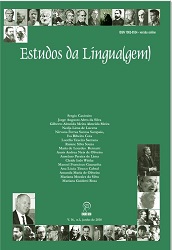O Interlocutive relationship between Brazilians and immigrants established in Brazil: implication of the domain of a gender modality of daily dialogue
DOI:
https://doi.org/10.22481/el.v16i1.4882Abstract
The present work shows first results from an analysis aiming to understand differences between linguistic and grammatical mastery of a language compared to the mastery of a particular speech genre and/or modality of speech genre, as well as how speech genre mastery implies in the process of meaning-production during interlocutive relationship. Relied on theoretical peculiarities from Bakhtin (2003) and Selinker (2014), focusing on issues such as speech/enunciation production and the interlocutive relationship as determinant factors for the genre, we tried to understand the dynamics of the process departing from a specific modality of speech genre namely the daily dialogue between speakers of different languages. Material analysis made us recognize in the speeches of the interviewed volunteers three types of interlocutive relationships associated to actors in different social roles as fertile ground to the study of the influence of such relations in the meaning establishment (or not) between interlocutors. Our material for the investigation is, thus, the transcription of an interview with two immigrant individuals stablished in Francisco Beltrão – PR, Brazil. Data assessment is of qualitative and comparative nature. The analysis of enunciations produced by the interviewed volunteers helped us to understand the bakhtininan theory over interlocutive relationship between actors in their social roles and the implication of the mastery of a discursive genre as a shared condition and relevant factor for meaning production and meaning negotiation.
Downloads
Downloads
Published
How to Cite
Issue
Section
License

Estudos da Língua(gem) is licensed under a Creative Commons Attribution 4.0 International License.
Authors who publish in the journal Estudos da Língua (gem) agree with the following terms:
The journal Estudos de Língua(gem) maintains the copyrights of the contributions published. These rights include the publication of the contribution and make its content available for free through the portal.







